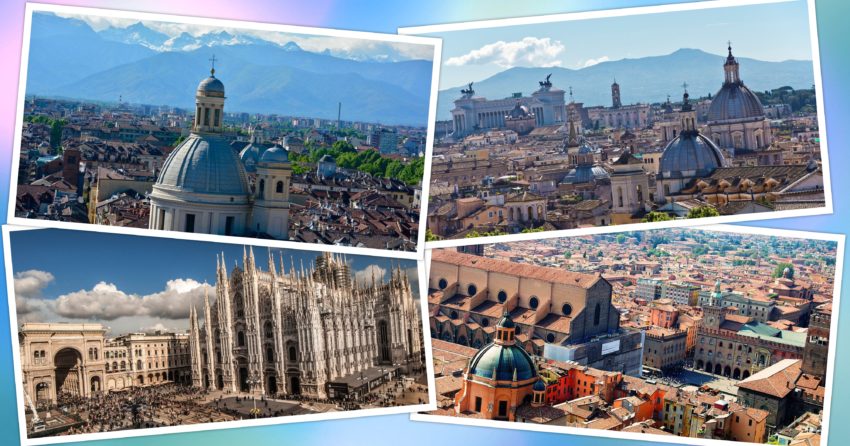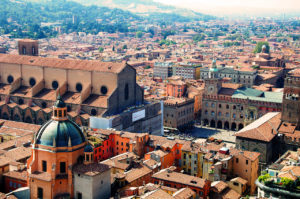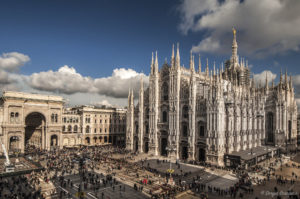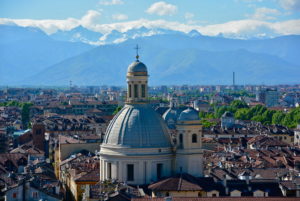
After Måneskin’s victory in Rotterdam, Head of the Italian Delegation Simona Martorelli announced the forthcoming opening of a bid to host the next edition of the event. We take a closer look at the cities that could be in play as host city for the 2022 Eurovision Song Contest.
2022 will be Italy’s third time hosting the show, the first being in Naples in 1965 (after the victory of Gigliola Cinquetti with Non ho l’età) and the second in Rome in 1991 (after Toto Cutugno won the competition in Zagreb with 1992: Insieme).
The first candidatures have already arrived from all over the Boot of Europe – from Verona to Bari, via Pesaro and Florence – and many more will probably follow (including the unthinkable one, such as when someone suggested the small Sanremo’s Ariston Theatre). However, only a few of these cities can truly aspire to host the 2022 Eurovision Song Contest.
The Italian National broadcaster Rai will organise the bidding process and the details will be revealed in due time. In the meantime, let’s look at the key requirements to be an ESC host city. Shall we?
Key requirements
In order to be able to nominate a city and a specific structure, the criteria to be met are:
- The city must have an indoor arena or alternatively a roofed structure with a capacity of at least 10,000 seats and a height of at least 18m.
- The city must have convenient connections to one or more international airports.
- There must be adequate accommodation capacity (to accommodate tens of thousands of people, including tourists, journalists and delegations).
- Other smaller requirements include a suitable space for the Press Centre and the Eurovision Village. According to previous EBU reports, the former should cover a surface between 6,000 and 10,000 square metres with exceptional phone and broadband connection plus other technical prerequisites. The latter should be between 600 and 1,000 square metres and include six bars and two stages.
Bologna
 Location: Emilia-Romagna, northern Italy
Location: Emilia-Romagna, northern Italy- Population: 394,463
- Possible venue: Unipol Arena (18,800 seats)
- Airports: Guglielmo Marconi International Airport
The candidacy of Bologna, the capital of Emilia-Romagna, was not long in coming after the results of the Grand Final. The city’s councillor for Culture and Sport Matteo Lepore posted a very convincing Facebook message, where he complimented the Italian delegation and presented Bologna as a possible host city for Eurovision 2022. Lepore does not want to miss this opportunity as he explained his intention to write to Rai (and even to Italian President Sergio Mattarella!) to let them know that Bologna is willing to play an active role in the organisation of the event.
It needs to be said that the city has extraordinary logistics and venues for musical events. The Unipol Arena, just outside of Bologna, is one of the biggest in the whole country and meets all specificities described in the key requirements.
Bologna is also one of UNESCO Cities of Music thanks to its rich musical tradition and the abundance of musical institutions (such as the Teatro Comunale, the Conservatoire and the Accademia Filarmonica), As such, the city purposely supports the internationalization of music projects and 2022 Eurovision could be the perfect opportunity to do so.
Pros: Bologna ticks all the boxes. It’s a vibrant city with an amazing venue and a deep connection with music. It’s the home of the oldest university in Europe, and it could very well be the next host of Eurovision.
Cons: The Arena is located within a large business park but has no adjacent facilities that can be used as Press Centre. A solution, in this case, could be the installation of a pavilion in the nearby car park.
Milan
 Location: Lombardy, northern Italy
Location: Lombardy, northern Italy- Population: 1,397,715
- Possible venue: Mediolanum Forum (12,700 seats)
- Airports: Milan Linate, Milan Malpensa, Orio al Serio
In a Facebook post published a few minutes after Italy’s victory, Milan’s Councillor for Urban Planning and Agriculture Pierfrancesco Maran combined his congratulations to Måneskin with the hope that Milan might host the Eurovision in 2022.
On top of being home to an important Rai television production centre, Milan has numerous facilities that could host the event comfortably. Remember the EXPO in 2015? Milan proved to have the means to accommodate international events and manage considerable flows of visitors.
In terms of accommodation capacity, Milan can count on around 77,000 beds and more than 41,000 rooms in hotels and similar facilities. It should be added that Milan is preparing to host the Winter Olympics in 2026, with major investments that could flow into the organisation of the most popular musical event in the world. Let’s not forget that, much like Bologna, the city is also part of the UNESCO Cities of Music network and largely supports musical events.
Pros: Milan is well-connected to the rest of Europe by plane, train and even car. It boasts the best infrastructures among all the bidders. The Teatro Repower, a theatre near the main indoor arena, could be used as the primary choice for the Press Centre. What can I say about Milan that hasn’t been said? Arguably the most international city in the country, it’s the Italian capital of fashion and finance and, in my opinion, the one to beat in the bid.
Cons: The only weak point of Milan’s candidacy is that Mediolanum Forum does not meet the 18m height requirement by less than two meters. However, Pallazzo delle Scintille (13,500 seats) could be an alternative solution, being 32m high.
Rome
 Location: Lazio, central Italy
Location: Lazio, central Italy- Population: 2,783,809
- Possible venue: Palazzo dello Sport (10,500 seats)
- Airports: Rome Ciampino, Rome Fiumicino
Host of the Eurovision Song Contest in 1991, Rome is another big contender in the race to win the bid. Virginia Raggi, the mayor of the city, has shown interest in bringing the contest back to the capital after 31 years.
Rome can count on the Palazzo dello Sport, the largest event venue in the capital, with a maximum capacity of over 10,500 seats (going down to 10,000 with a stage). The structure is 35m high at the highest point of the vault. Back in 1960, the arena hosted the Olympic Games Basketball tournaments!
Since 2015 the capital is part of the UNESCO Cities of Film Network, which enhances Rome’s cinema and audio-visual heritage as well as promote access, participation and inclusion of communities and citizens in the local cultural scene.
Pros: Much like Milan, Rome does meet all key requirements and the city has already hosted the Eurovision Song Contest in 1991 at Cinecittà Film Studios. The capital is also the hometown of our current winners, which is something to keep in mind.
Cons: A critical issue that could make the use of the Palazzo dello Sport problematic (if not impossible) is the vaulted ceiling which does not allow the hanging of suspended loads, normally used for Eurovision. Not to mention that, should the contest be held in Rome, the organisers need to make sure they avoid the organisational problems encountered in 1991.
Turin/Torino
 Location: Piedmont, northern Italy
Location: Piedmont, northern Italy- Population: 848,196
- Possible venue: Pala Alpitour (also known as Palalsozaki) (13,347 seats)
- Airport: Sandro Pertini International Airport
Turin seems to be an early favourite. Geographically advantaged by its proximity to France and Switzerland, the city has been looking to host the contest for years now. RAI confirmed that in 2017 the broadcaster was in talk with the administration of Turin in case Francesco Gabbani had won the contest in Kyiv with Occidentali’s Karma.
The mayor of Turin, Chiara Appendino, replied to a tweet by Eurovision announcing the opening of the bid where she stated she is working on the candidacy. According to the latest data from the Italian National Institute of Statistics, Turin can count on almost 38,000 beds and just under 18,000 rooms in hotels and similar establishments to accommodate the Eurovision crowd of performers, technicians, journalists and fans. Several larger international events have taken place in Turin, such as the Winter Olympics in 2006, and there’s no doubt the city could be a fantastic host for the Eurovision Song Contest next May.
Pros: Turin has the same strengths of Milan, but it could funnel its resources into the Eurovision better than its bigger neighbour. Should the capital of Piedmont be chosen to host the contest, it could benefit from its proximity to Milan and its surrounding airports. The city is a regal and picturesque representative of the history and culture of Italy.
Cons: One of the downsides of Turin’s candidacy is the question mark over the location of the Press Centre. A solution must be found in the surroundings of the Pala Alpitour. Large tents have been used in the past, and could certainly be an option here.
Final thoughts
The bidding race is going to be a tight one. Whichever city will host the competition will be tasked with an important mission: to meet the incredible standards set by Rotterdam in 2021 and, if possible, to surpass them.
According to one of the latest EBU press releases, Italy scored a record-high audience during the last show in Rotterdam since it re-joined the contest in 2011 as part of the Big Five. About 4.3 million viewers tuned in at the grand final – amounting to 24.4% of TV viewing in the country. The 1991 Eurovision Song Contest is remembered as a less than a brilliant one on several fronts (first and foremost organisational), so the time has come for Italians to redeem themselves.
The pressure is on, and we are looking forward to seeing who is going to win this race, and where we will all be heading come next May!




















